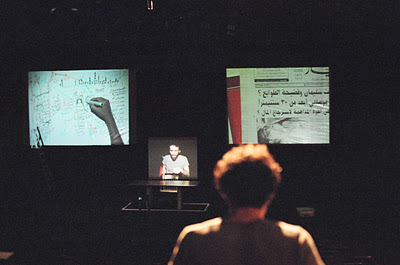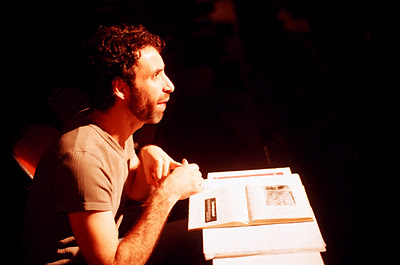Looking for a Missing Employee – Curatorial Statement
January 12, 2012
By Glenn Alteen, Program Director for grunt gallery
I first visited Lebanon in December of 2007 and was struck by the work I saw there. Rabih Mroué’s performances exist in a context of other artists in his generation who came of age during the Civil War in Lebanon during the 1980’s and their work has a shared interest in found photography and video as elements to be repurposed into story telling. Mroué shares with Walid Raad of The Atlas Group, Akram Zaatari and the Arab Image Foundation, Lamia Joreige and many others an interest in photography and
video as media to explore the war and its lingering effects on their society.
I was travelling with fellow curator and gallery director Vittorio Urbani from Venice’s Nuova Icona Gallery who had earlier that year been commissioner for Lebanon’s pavilion in the 52nd Venice Biennale: the first time Lebanon had participated. He had been invited to visit Lebanon and asked me to accompany him and because this was a golden opportunity to explore an art scene that had lately interested me and I wanted to know more about I jumped at the opportunity.
Through Vittorio I was able to meet a large range of artists in the community and we had the opportunity to visit Ashkal Alwan the dynamic media centre in Beirut and it was there I viewed a video of the performance Looking for a Missing Employee as well as other work by Rabih Mroué. I was immediately struck by how Mroué was using the found media and the liberties he took with the material. The work was fresh, brazen and provocative in ways I had never seen before and frankly haven’t seen since.
Mroué wasn’t in Lebanon at the time but we did have coffee with his wife and collaborator Lina Saneh whose work is fresh and exciting in its own right and who I would love to see in an upcoming PuSh Festival. I came back raving to Norman about their work.
I returned to Lebanon in early 2008 for Ashkal Alwan’s amazing conference Homeworks 4 where I was able to take in “How Nancy Wished that Everything Was an April Fool’s Joke” Mroué’s epic retelling of the war through the myriad of factions that fought in it. The four actors sat passively onstage as different posters of the different factions of the Lebanese right and left flashed over their heads and they retold heroic tales of their deaths. The collective weight of the stories and the vitriolic retelling spoke to the futility of the conflict and the lasting yet contradictory lessons that were taken from it.
I still don’t know how to categorize Mroué’s work. As a refugee from theatre who migrated to visual art and performance I have a hard time placing exactly what he does. Theatre has always been for me a medium based in storytelling while performance takes its strength from image making but Mroué is somewhere between the two. His use of found media to make meaning is fascinating and disturbing but perhaps a fitting tribute to a war that left 300,000 dead and no one to atone for any of those losses. This generation of artists takes its impetus from making meaning out of the atrocity that was the Civil War in Lebanon. If they take liberties with the truth it is only because the truth is impossible to discern within this constantly shifting political landscape where deception and subterfuge go hand in hand. Mroué tells us a story that will knock your socks off as he takes us places we have never been before!!!! Don’t miss it!
For more information about Looking for A Missing Employee, click here.
For more information about The Pixelated Revolution, click here.
To purchase tickets, click here.

